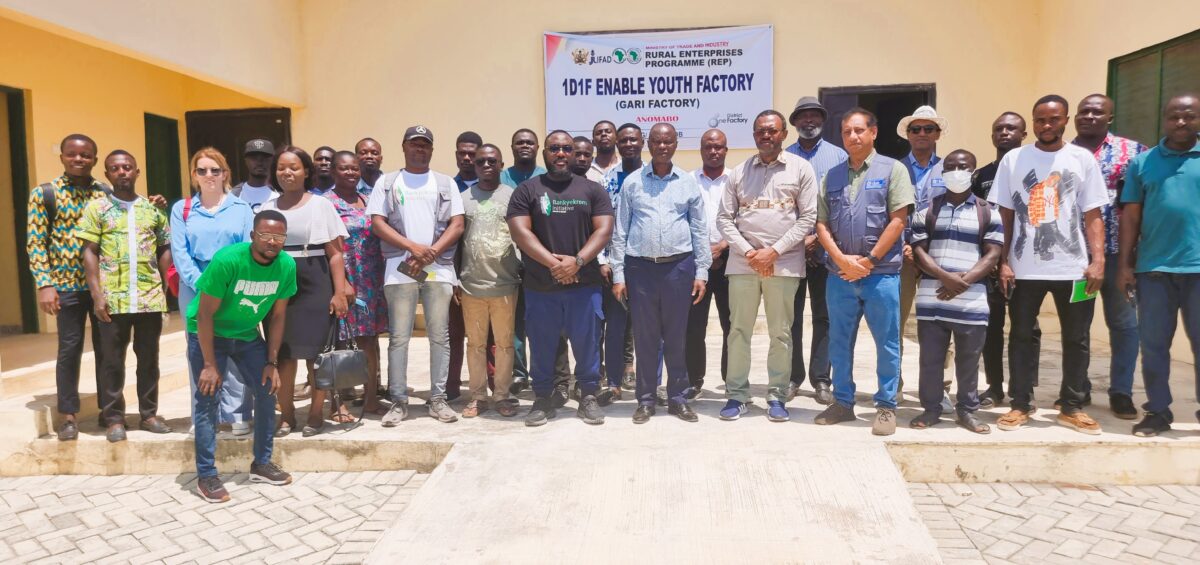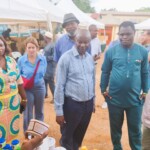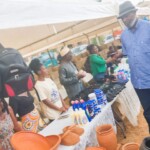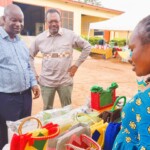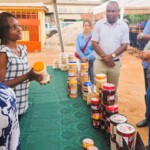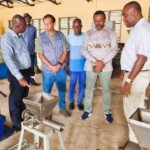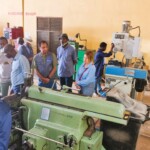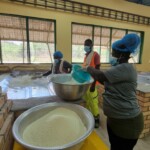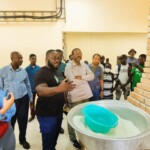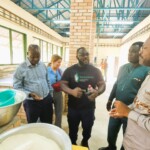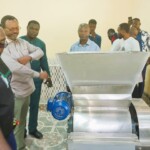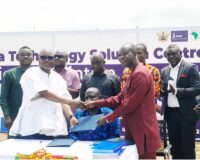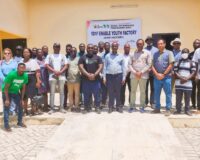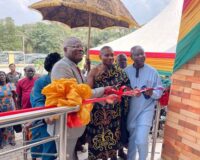In Ghana’s Central Region, a recent visit by a high-profile International Fund for Agricultural Development (IFAD) delegation spotlighted the transformational impact of the Rural Enterprises Programme (REP). On Monday, October 21, 2024, the IFAD delegation visited the Mfantseman Municipality in Ghana’s Central Region to observe firsthand the activities and successes of the Rural Enterprises Programme (REP). This flagship initiative, aimed at fostering sustainable local economies, particularly in rural areas, has become a testament to the potential of small and medium-scale enterprises in transforming livelihoods. The team were in the country to discuss Ghana’s Country Strategy and Programme Evaluation (CSPE) with stakeholders.
 The IFAD delegation, led by Dr. Indran A. Naidoo, Director of IFAD’s Independent Office of Evaluation, and Mr. Bernard Hien, Director for the West and Central Africa Division, along with other IFAD staff from Rome and Ghana, was accompanied by key figures from Ghana’s local government and REP leadership, including the National Director, Mr. Kwasi Attah-Antwi, and Mfantseman’s Municipal Chief Executive, Hon. Ike Lord Ennu.
The IFAD delegation, led by Dr. Indran A. Naidoo, Director of IFAD’s Independent Office of Evaluation, and Mr. Bernard Hien, Director for the West and Central Africa Division, along with other IFAD staff from Rome and Ghana, was accompanied by key figures from Ghana’s local government and REP leadership, including the National Director, Mr. Kwasi Attah-Antwi, and Mfantseman’s Municipal Chief Executive, Hon. Ike Lord Ennu.
Their first stop was the Technology Solution Center (TSC) in Mankessim, a town known as the commercial heart of the Mfantseman Municipality. The TSC operates as a metal-based fabrication workshop, providing critical support to micro, small, and medium-scale enterprises (MSMEs) across Ghana. These centres are hubs for technical training, spare parts production, and technology solutions, enabling MSMEs to grow and contribute to the economy with high-quality products and services.
Showcasing Local Enterprise: The Mini Exhibition at TSC
As part of the visit, a mini exhibition was organized by 25 REP beneficiaries from Mfantseman and neighbouring districts. The entrepreneurs showcased various trades, from agro-processing—cassava, cereals, coconuts, and oil palm—to soap-making, catering, cosmetics, ceramics, fashion, leatherworks, and animal husbandry. Each beneficiary shared stories of how REP training and equipment support helped them establish their businesses. Others pointed to how REP’s credit delivery in the form of matching grants and operational funds, advanced technical skills training and support to achieve certification with Ghana’s Food and Drug Authority and Ghana Standards Authority, have assisted them to grow their businesses.
 The IFAD delegation took a keen interest in the stories of these entrepreneurs, recognizing the far-reaching impact of the Programme. Mr. Bernard Hien, in a heartfelt address, explained the purpose of the IFAD team’s visit. “We have been reading a lot on the REP project but this visit has provided us with the opportunity to see concretely what has been the tangible results of IFAD’s partnership with the Government of Ghana in supporting rural enterprises,” he remarked.
The IFAD delegation took a keen interest in the stories of these entrepreneurs, recognizing the far-reaching impact of the Programme. Mr. Bernard Hien, in a heartfelt address, explained the purpose of the IFAD team’s visit. “We have been reading a lot on the REP project but this visit has provided us with the opportunity to see concretely what has been the tangible results of IFAD’s partnership with the Government of Ghana in supporting rural enterprises,” he remarked.
“After this visit, I am really convinced that micro and small enterprises are the backbone of the African economy” he added, noting the impressive range of locally produced goods. He praised the efforts of entrepreneurs present like “Mama Tooba,” who had achieved significant growth, evidenced by her branded vehicle promoting “Mama Tooba Hair Products”, which had been parked at the venue for the exhibition.
Mr. Hien concluded by commending the participants for their entrepreneurial spirit, “We’re deeply appreciative, and we wish you every success. When we return, we look forward to seeing how your businesses have grown to create even more jobs and opportunities.”
Visitt to the Anomabo Cassava Processing Factory
After their time at the TSC, the delegation headed 18.7 kilometres westward to the Anomabo cassava processing factory, one of the 58 small-scale factories under REP’s 1D1F ENABLE Youth Initiative. This facility, now operated by Bankyekrom Limited, is a valuable resource for local youth who are entering the agricultural value chain and cassava farmers in general in the district, with a focus on producing high-quality gari. At the factory, the IFAD team engaged with Bankyekrom’s CEO, Shadrach Sarpei, to discuss challenges with sourcing raw materials and community benefits, as well as with the representatives of the ENABLE Youth group who shared their aspirations to contribute to the facility’s growth.
The delegation’s visit to the Mfantseman Municipality highlighted the REP’s achievements, showing how empowering young entrepreneurs and enhancing local production facilities contribute to a thriving, self-sustaining economy. Through their interactions, the IFAD team gained invaluable insights into the local realities that bring IFAD’s mission to life, reinforcing their commitment to expanding the opportunities available to Ghana’s rural entrepreneurs.


